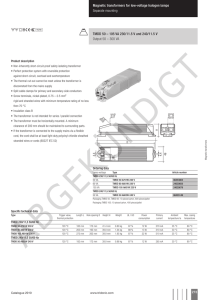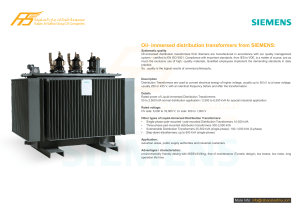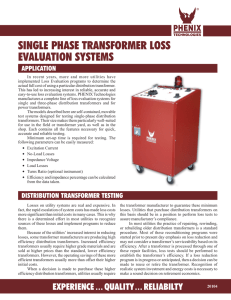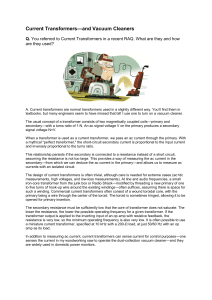Electrical Power, Enery, and Controls Seminar
advertisement
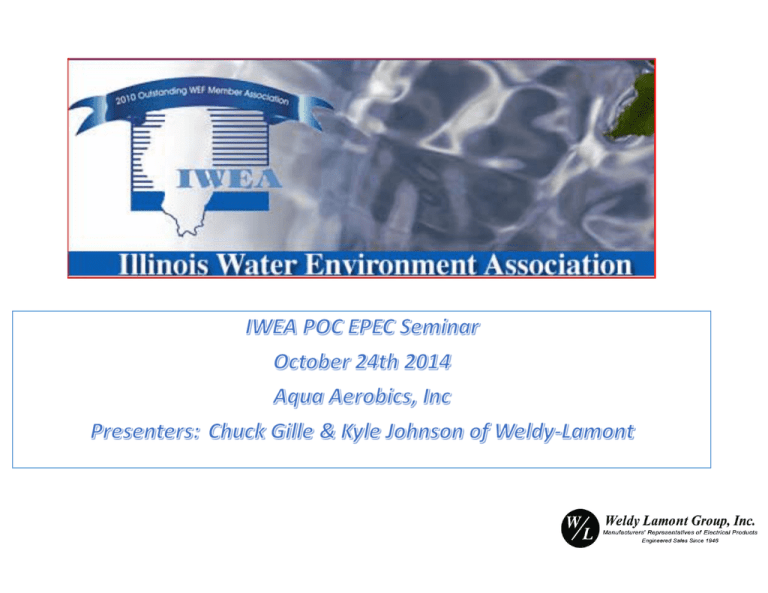
Product Scope: Substation • Three‐Phase or Single‐Phase, 50 or 60 Hz, • 55ºC, 65ºC, 75ºC, 55ºC/65ºC, 55ºC/75ºC, 65ºC/75ºC • Envirotemp FR3 fluid or Mineral Oil • Three‐Phase: 300 – 12,000 kVA • Single‐Phase: 167 – 6,667 kVA • Primary Voltage 2400 – 46,000 V • Secondary Voltage 208Y/120 V ‐ 24,940 V Wye • Specialty Designs • • • • • • • • • • Inverter/Rectifier Bridge K‐Factor Hazardous Location (Class 1 Div 2) Internal Circuit Breaker (VFI) and/or Visual Break Fans UL Listed & Labeled/ Classified Factory Mutual (FM) Approved Differential Protection 6 or 12 Pulse Designs Grounding Transformers Substation Product Scope • Substation Types • Primary Open • Secondary Open • Definition • Open ‐ Cover mounted Bushings • Primary ‐ Above 2500 kVA, Secondary voltage above 1000 Volts • Secondary ‐ 2500 kVA and below with less than 1000 Volt secondary Substation Product Scope • Substation Types • Primary Unit • Secondary Unit • Definitions • Unit ‐ Sidewall mounted bushings typically in a lineup • Primary/Secondary same as previous slide Product Scope: Padmount • Three‐Phase 50 or 60 Hz, • 55ºC, 65ºC, 75ºC, 55ºC/65ºC, 55ºC/75ºC, 65ºC/75ºC • Envirotemp FR3 fluid or Mineral Oil • Three‐Phase: 45 – 10,000 kVA • Primary Voltage 2400 – 46,000 V • Secondary Voltage 208Y/120 V ‐ 24,940/14,400 V Wye • Specialty Designs • • • • • • • • • K‐Factor UL Listed & Labeled/ Classified Factory Mutual (FM) Approved Solar/Wind Designs Differential Protection 6 or 12 Pulse Designs Grounding Transformers Internal Circuit Breaker (VFI) and/or Visual Break Fans Transformer Design • Winding Material • Aluminum or Copper • Dead Front or Live Front • Secondary under 600 Vac must be Live Front • Arresters • Color • Loop Feed or Radial Feed • Special Impedance requirements • Special bushing heights/spacing Padmount Product Scope Transformer Design • Losses other than DOE requirements • Overcurrent protection inside transformer • VFI, fuses or none • Switching inside transformer • T‐blade, V‐blade, On/Off or none • Visual Break with VFI or switches • Containment pans for indoor transformers • Contacts added to gauges • UL, c‐UL Listing, UL Classified, FM Approval Transformer Design – Arc Flash • Arc‐Flash Issues • Not able to shut‐down transformers for maintenance due to critical loads and/or system design. • Padmount – move items external to cable termination compartment • • • • • Nameplate Liquid‐sample valve Gauges Switch operating handle Add IR windows External Gauges and Sampling Valve External Gauges enclosure DOE Efficiency Requirements – Indoor Liquid-filled Transformers IEEE Power & Energy Society December 09, 2009 DOE 10 Code of Federal Regulations (CFR) Part 431 Minimum Efficiency The Ruling and its effects Background DOE Minimum Efficiency: • History • The Department of Energy (DOE) studied raising distribution transformer efficiency; • Technologically Feasible, • Economically Justifiable, • and Produce Significant Energy Savings • FINAL RULING PUBLISHED OCTOBER 12, 2007 • The Driver is to Reduce CO2 Emissions The Ruling The Ruling (10 CFR Part 431) • A level between TSL‐4 and TSL‐5 was established for Single‐phase transformers 10‐833 kVA • Three‐phase 45‐2500 kVA units must meet a level between TSL‐2 and TSL‐3 • The Ruling applies to all units manufactured 01‐01‐2010 and beyond • Does not affect distributor stock, only manufacturers • All transformers produced and imported to the U.S. • Does not apply to rebuilt transformers • Enforcement mechanisms are not fully defined DOE Ruling – Single and Three-phase Efficiency Standard Comparison kVA NEMA TP-1 Efficiency (%) DOE 10 CFR Part 431 Efficiency (%) 15 98.1 98.36 30 98.4 98.62 45 98.6 98.76 75 98.7 98.91 112.5 98.8 99.01 150 98.9 99.08 225 99 99.17 300 99 99.23 500 99.1 99.25 750 99.2 99.32 1000 99.2 99.36 1500 99.3 99.42 2000 99.4 99.46 2500 99.4 99.49 All efficiency values are at 50 percent of nameplate-rated load DOE Ruling – Dry Type Liquid vs. Dry DOE 10 CFR Part 431 Efficiency (%) Comparison kVA Liquid-Filled Transformers Dry Transformers 45-95 kV BIL 15 98.36 97.18 30 98.62 97.63 45 98.76 97.86 75 98.91 98.12 112.5 99.01 98.30 150 99.08 98.42 225 99.17 98.57 300 99.23 98.67 500 99.25 98.83 750 99.32 98.95 1000 99.36 99.03 1500 99.42 99.12 2000 99.46 99.18 2500 99.49 99.23 Efficiency Levels So, Does 0.3% Difference in Efficiency Matter? • Efficiency = Rated output Rated output + Total losses • Example If Performing a “Loss Evaluation” on 1500 kVA Transformers • Based on $.06/kW‐Hr • Present Value Factor based on 6% interest over 10 years • Overall conservative evaluation Efficiency Levels So, Does 0.3% Difference in Efficiency Matter? • Efficiency = Rated output Rated output + Total losses • Example If Performing a “Loss Evaluation” on Transformers • Based on $.06/kW‐Hr • Present Value Factor based on 6% interest over 10 years • Overall conservative evaluation • Example for Efficiency Difference for 1500 kVA • Liquid‐filled transformer • 99.42% efficient @ 50% load per DOE • Total losses ~ 4375 watts (@50% load) • Present value of cost of losses ‐ $16,922 • Annual cost of losses ‐ $2300 @ 50% Load ~ $3548 @ 75% Load Efficiency Levels So, Does 0.3% Difference in Efficiency Matter? • Efficiency = Rated output Rated output + Total losses • Example If Performing a “Loss Evaluation” on Transformers • Based on $.06/kW‐Hr • Present Value Factor based on 6% interest over 10 years • Overall conservative evaluation • Example for Efficiency Difference for 1500 kVA • Liquid‐filled transformer • 99.42% efficient @ 50% load per DOE • Total losses ~ 4375 watts (@50% load) • Present value of cost of losses ‐ $16,922 • Annual cost of losses ‐ $2300 @ 50% load ~ $3548 @ 75% load • Dry transformer • 99.12% efficient @ 50% load per DOE • Total Losses ~ 6659 watts (@50% load) • Present value of cost of losses ‐ $25,757 • Annual cost of losses ‐ $3500 @ 50% load ~ $5322 @ 75% load $1200 ‐1750 savings per y DOE Efficiency Requirements 2010 vs. 2016 DOE Liquid Filled 2010 vs. 2016 Efficiencies kVA 2010 2016 15 98.36 98.65 30 98.62 98.83 45 98.76 98.92 75 98.91 99.03 112.5 99.01 99.11 150 99.08 99.16 225 99.17 99.23 300 99.23 99.27 500 99.25 99.35 750 99.32 99.4 1000 99.36 99.43 1500 99.42 99.48 2000 99.46 99.51 2500 99.49 99.53 2016 DOE Manufacturer Implications • Manufacturers will need to revise most of their active catalog numbers before 1‐1‐2016 to meet requirements • The new efficiency levels will shift some raw material usage to amorphous cores. • There may be new manufacturing challenges for many manufacturers in terms of design, manufacturing, or material procurement. 2016 DOE Consumer Implications • Transformer weights will change • Depends greatly on specific customer designs & specific product designs, but in general… • • • • Increase in core/coil weight Decrease in fluid volume (core/coil displacement) Overall weight increases slightly Dimensions don’t appear to change dramatically • Transformer costs and prices will increase • Estimates of a 5‐15% price increase over the previous efficiency standard for qualifying 3‐phase transformers • Actual price increases are a function of what customers are paying today, movements in the materials markets, and are design specific. NEC® Compliance • Indoors • Liquid‐Filled Transformers • Less‐flammable fluid‐filled – NEC 450‐23 • • • • • Minimum 300°C fire point In Type I or Type II non‐combustible building No combustible materials around transformer Liquid containment Installation to comply with all fluid listing restrictions. • UL Classification • FM Approval UL Classification of Envirotemp™ FR3™ • Listed less flammable fluids • 45 – 10,000 kVA 3Ø transformers • Substation • Pad‐mounted • 12 psig internal pressure tank withstand rating • Minimum pressure relief device ratings* • Either current‐limiting fusing or other over‐current protection* • Other over‐current protection may include: • Externally mounted expulsion fusing • Primary breakers • Only natural ester based fluid is permitted to use either CL fusing or other over‐current protection. *In accordance with UL Classification Marking UL Classification of Envirotemp™ FR3™ FM Approved transformer requirements • Developed Approval Standard 3990 • FM Approved transformer • 1998 • Restrictions based on transformer protection very similar to the UL Classification except in addition to fusing, pressure relief and tank withstand ratings: • Alarm contacts on pressure relief devices for indoor installations >500 kVA • Rapid rise relays >2500 kVA • Temperature, level and pressure‐vacuum gages • Ground fault CT on neutral • Installation limitations, i.e. clearances to walls, etc. Envirotemp™ FR3™ fluid Benefits • Fire safety characteristics • Environmental characteristics • Performance characteristics / enhanced life FR3™ and Envirotemp™ are licensed trademarks of Cargill, Incorporated. Fire point • Mineral oil: 155 C • Less‐flammable: min. 300 C (Required by NEC 450‐ 23) • Envirotemp™ FR3™ : 360 C FR3™ and Envirotemp™ are licensed trademarks of Cargill, Incorporated. Why Choose a Less-Flammable Fluid-Filled Transformer Fire Safety Fire safety • Envirotemp™ FR3™ • 17 Years of service • >450,000 installations • No reported fires ‐ NFPA • R‐Temp fluid – • • • • Predecessor to FR3 35 Years of service >250,000 installations No reported fires – NFPA FR3™ and Envirotemp™ are licensed trademarks of Cargill, Incorporated FM Approved Transformer • 1994 ‐ FM Changes Approval Restrictions • Revised Less‐Flammable Fluid Approval • Developed New Transformer Approval Standard 3990 National Electric Code 450.23 • 450.23 Less‐Flammable Liquid‐Insulated Transformers. Transformers insulated with less‐flammable liquids that have a fire point of not less than 300C shall be permitted to be installed in accordance with 450.23(A) or 450.23(B). NFPA 70 450.23(B) • (B) Outdoor Installations. Less‐flammable liquid‐filled transformers shall be permitted to be installed outdoors, attached to, adjacent to, or on the roof of buildings where installed in accordance with (1) or (2): (1) For Type I or Type II buildings, the installation shall comply with all listing restrictions provided for in the listing of the liquid. FPN: Installations adjacent to combustible material, fire escapes, or door or window openings may require additional safeguards such as those listed in 450.27 (2) In accordance with 450.27. Making Your Medium Voltage Transformer Installations NEC® Compliant ≤10,000(38) >10,000(38) NFPA 70 450.23(A) • (A) Indoor Installations. Indoor installations shall be permitted in accordance with the following: (1) In Type I or Type II buildings, in areas where all of the following requirements are met: a. The transformer is rated 35,000 volts or less. b. No combustible materials are stored. c. A liquid confinement area is provided. d. The installation complies with all the restrictions provided for in the listing of the liquid. (2) With an automatic fire extinguishing system and a liquid confinement area, provided that the transformer is rated 35,000 volts or less. (3) In accordance with 450.26 Why Choose a Less-Flammable Fluid-Filled Transformer • What Happened to the Indoor Liquid‐Filled Transformer? • PCB‐insulated transformers were the indoor transformer of choice until the mid 1970’s. • Fears developed regarding replacement fluids • Environmental concerns • What was the EPA going to ban next? • Some transformer manufacturers leaped from the frying pan into the fire – Introduced non‐flammable alternatives • Freon • Tetrachloroethylene (dry cleaning fluid) • Fire Safety Concerns • Operational Concerns Why Choose a Less-Flammable FR3 Fluid-Filled Transformer What Did You Give Up? • • • • • Higher efficiency / lower losses Greater overload capability Greater contamination resistance Higher BIL’s Smaller footprint • • • • • Lower temperature operation Lower noise levels Full diagnostic capabilities Longer life Dramatic cost savings Transformer Ratings Envirotran PLUS kVA Ratings FR3® - Filled 65ºC Rise KNAN (+12%) 75ºC Rise KNAN (+9%) 55ºC Rise KNAF (+15% or 25%) 65ºC Rise KNAF (+12%) 75ºC Rise KNAF (+9%) 500 560 610 575 644 702 750 840 916 863 966 1053 1000 1120 1221 1150 1288 1404 1500 1680 1831 1725 1932 2106 2000 2240 2442 2300 2576 2808 2500 2800 3052 3125 3500 3815 3750 4200 4578 4688 5250 5722 5000 5600 6104 6250 7000 7630 7500 8400 9156 9375 10500 11445 10000 11200 12208 12500 14000 15260 Fan Cooled 55ºC Rise KNAN 55/65/75°C Rise With Forced FA KVA FA KVA Base KVA Available KVA @ Available KVA '@ Available Available Available Air @ 55 ° @ Ampacity Ampacity @ 55 ° C Ampacity 65 ° C Ampacity 75 ° C Ampacity Cooling C 65 ° C Fans FA Available KVA @ Ampacity 75 ° C 500 601 560 674 610 734 → 575 692 644 775 702 844 750 902 840 1010 916 1102 → 863 1038 966 1162 1053 1267 1000 1203 1120 1347 1221 1469 → 1150 1383 1288 1549 1404 1689 1500 1804 1680 2021 1831 2202 → 1725 2075 1932 2324 2106 2533 2000 2406 2240 2694 2442 2937 → 2300 2766 2576 3098 2808 3378 2500 3007 2800 3368 3052 3671 → 3125 3759 3500 4210 3815 4589 3000 3608 3360 4041 3662 4405 → 3750 4511 4200 5052 4577 5505 Why Choose a Less-Flammable Fluid-Filled Transformer • Greater Overload Capability Why Choose a Less-Flammable Fluid-Filled Transformer • Full Diagnostic Capabilities • Dry‐type • Megger Power Factor Infra‐Red Scan • Liquid‐filled • Color Acidity Dielectric Breakdown Voltage Dissolved Gas Analysis Metals Analysis Inhibitor Content Interfacial Tension Infra‐Red Scan Power Factor Furan Analysis Water Content Specific Gravity Lower sound level • 750 – 2500 kVA • Liquid‐filled transformers operate at 5‐6 db less than dry transformers* • 3db doubles sound power to your ear *NEMA TR‐1 Less-Flammable Fluid-Filled Transformer • Lower Sound Levels • 750 – 2500 kVA • Liquid‐filled will be 5‐6 db less than dry type • 3db doubles sound power Dry Type Liquid Filled Why Choose a Less-Flammable Fluid-Filled Transformer • Higher Basic Impulse Level (BIL) • 15kV • Liquid – 95kV Standard • Dry – 60kV Standard • 35kV • Liquid – 200kV Standard • Dry – 150kV Standard • 480V • Liquid – 30kV Standard • Dry – 10kV Standard Why Choose a Less-Flammable Fluid-Filled Transformer Ease of Installation Why Choose a Less-Flammable Fluid-Filled Transformer Smaller footprint • Transformer • Primary switchgear • Lower Cost for lineup • Overall benefit: • Fit same equipment into smaller electrical rooms • Reduced cost Liquid vs. Dry Dimension Comparison Close Coupled Liquid-filled Foot print comparison • Based upon published standard sizes for • • CPS Liquid Filled Transformers Cast Coil Dry Type Transformers Higher Efficiency = Reduced Losses Efficiency kVA 500 750 1000 1500 2000 2500 Liquid 99.25% 99.32% 99.36% 99.42% 99.46% 99.49% Dry 98.83% 98.95% 99.03% 99.12% 99.18% 99.23% Liquid Liquid Efficiency Advantage 35.9% 35.2% 34.0% 34.1% 34.1% 33.8% Losses (Watts) 3,750 5,100 6,400 8,700 10,800 12,750 $ $ $ $ $ $ Dry D.O.E. Liquid 16,425 22,338 28,032 38,106 47,304 55,845 Losses (Watts) 5,850 7,875 9,700 13,200 16,400 19,250 Higher Efficiency = Reduced Losses D.O.E. Dry $ 25,623 $ 34,492 $ 42,486 $ 57,816 $ 71,832 $ 84,315 • Save nearly $30,000 in Energy Costs • Directly tied to Losses • Savings based upon D.O.E. Efficiency for 2500kVA Liquid vs Dry Per D.O.E. Ruling; Liquid Filled Transformers up to 2500kVA are approximately 35% more efficient than their Dry Type counterparts. * “Liquid Savings” Evaluated over 5 years, based upon $.10kW Energy Rate, Load + No Load Losses Liquid Savings $ 9,198 $ 12,154 $ 14,454 $ 19,710 $ 24,528 $ 28,470 Higher Efficiency = Reduced Losses Cost of Losses 5 Year Cost of Losses $90,000 $85,000 $80,000 $75,000 $70,000 $65,000 $60,000 $55,000 $50,000 $45,000 $40,000 $35,000 $30,000 $25,000 $20,000 $15,000 $10,000 $5,000 $- $28,500 Savings $24,500 Savings $19,700 Savings $14,450 Savings $12,150 Savings $9,200 Savings 500 750 1000 1500 2000 kVA For all kVA Ratings; Liquid Filled Transformers = Lowest Cost of Losses 2500 D.O.E. Liquid D.O.E. Dry Efficiencies Considerably Less Total Losses than Cast Resin or VPI Dry Type Transformers Sound Levels Significantly Reduced Sound Levels and Vibration Operating Temperatures Cooler Operating Temperatures than Cast Resin and VPI Dry LEED Accreditation LEEDS Accredidation Points for Distribution Transformers Criteria Energy & Atmosphere Material & Resources Indoor Environmental Quality Innovation & Design up to 19 points -------- -------- -------- Description Up to 24% more efficient than equivalent non-DOE design Liquid Filled vs. Dry Type -------- -------- -------- -------- 20% less HVAC required FR3 Envirotemp Fluid Total Possible Points -------19 Points 1 point 1 point 1 point 1 point 5 points 5 points Positive carbon footprint DOE Transformer Obtain up to 26 LEED Points towards building installations 26 points Operation at Higher “Base” Temperature Introduction of the 75°C rise transformer Lockie Test Series (ANSI/IEEE C57.100) Insulation life extension • Aging of paper depends primarily on temperature and water content. • Paper aged in seed‐oil based fluid took 5‐8 times longer to reach end of life parameters than paper aged in mineral oil. FR3™ and Envirotemp™ are licensed trademarks of Cargill, Incorporated PEAK Transformer family • • IEEE Std C57.154™-2012 lists 75°C rise transformers PEAK transformers from Cooper Power Systems are designed to: • Utilizes an advanced high temperature insulation system • • • Thermally upgraded Kraft paper EnvirotempTM FR3TM dielectric fluid Optimized core and coil design. 67 Envirotemp™ and FR3™ are licensed trademarks of Cargill, Incorporated. PEAK Transformers – Three Options 1. Increased Overload Capacity • PEAK 65/75 ⁰C Average Winding Rise (AWR) • Operate PEAK transformers beyond full rated base load • Single‐phase at least 9% • Three‐phase at least 12% Envirotemp™ and FR3™ are licensed trademarks of Cargill, Incorporated. PEAK Transformers – Three Options 1. Increased Overload Capacity • PEAK 65/75 ⁰C Average Winding Rise (AWR) • Operate PEAK transformers beyond full rated base load • Single‐phase at least 9% • Three‐phase at least 12% • More precisely size transformers based on periods of peak demand—without accelerated reduction of insulation life • Continuous overload capabilities to 75⁰ C AWR • Maintains IEEE® per unit life requirements at 75 ⁰C AWR Envirotemp™ and FR3™ are licensed trademarks of Cargill, Incorporated. PEAK Transformers – Three Options 1. Increased Overload Capacity • PEAK 65/75 ⁰C Average Winding Rise (AWR) • Operate PEAK transformers beyond full rated base load • Single‐phase at least 9% • Three‐phase at least 12% • More precisely size transformers based on periods of peak demand—without accelerated reduction of insulation life • Continuous overload capabilities to 75⁰ C AWR • Maintains IEEE® per unit life requirements at 75 ⁰C AWR • 65 °C AWR and 75 °C AWR kVA ratings on the nameplate • Complies with IEEE Std C57.154™‐2012 standard • UL Listed Envirotemp™ and FR3™ are licensed trademarks of Cargill, Incorporated. PEAK Transformers – Three Options 2. Increased Overload Capacity • PEAK 55/75 ⁰C Average Winding Rise (AWR) • Operate PEAK transformers beyond full rated base load • Three‐phase at least 22% • More precisely size transformers based on periods of peak demand—without accelerated reduction of insulation life • Continuous overload capabilities to 75⁰ C AWR • Maintains IEEE® per unit life requirements at 75 ⁰C AWR • 55 °C AWR and 75 °C AWR kVA ratings on the nameplate • Complies with IEEE Std C57.154™‐2012 standard • UL Listed Envirotemp™ and FR3™ are licensed trademarks of Cargill, Incorporated. PEAK Transformers – Three Options 3. Smaller, Lighter Transformers • PEAK 75 ⁰C Average Winding Rise • Smaller and lighter than traditional 65 °C AWR transformers of the same kVA rating • Typically use less material and fewer gallons of dielectric fluid ─resulting in better value • Complies with IEEE Std C57.154™‐2012 standard • UL Listed Envirotemp™ and FR3™ are licensed trademarks of Cargill, Incorporated. PEAK™ transformer PEAK™ Transformer kVA Ratings Temp Rise (55 to 65-12%, 65 to 75-9%, 55 to 75-22%) Fans (500 to 2000-15%, 2500 to 10000-25%) 55ºC Rise KNAN 65ºC Rise KNAN 75ºC Rise KNAN 55ºC Rise KNAF 65ºC Rise KNAF 75ºC Rise KNAF 500 560 610 575 644 702 750 840 916 863 966 1053 1000 1120 1221 1150 1288 1404 1500 1680 1831 1725 1932 2106 2000 2240 2442 2300 2576 2808 2500 2800 3052 3125 3500 3815 3750 4200 4578 4688 5250 5722 5000 5600 6104 6250 7000 7630 7500 8400 9156 9375 10500 11445 10000 11200 12208 12500 14000 15260 Questions? Thank You For Your Time
